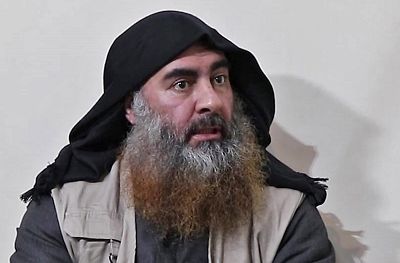The source proved to U.S. intelligence that he had direct access to Baghdadi this summer by turning over the ISIS leader's used underwear and a sample of his blood.
Kurdish-led forces allied with the United States in Syria provided information — including used underwear for a DNA analysis — that was key to the operation that killed Islamic State leader Abu Bakr-Baghdadi, the leader of the Kurdish militia said Monday.
In an exclusive interview with NBC News' Richard Engel, General Mazloum Abdi of the Syrian Democratic Forces said his militia had a source deep in Baghdadi's inner circle who described a room-by-room layout of the terrorist's compound on the Turkish border, including the number of guards, floor plan and tunnels.
Kurdish intelligence operatives who managed the source passed that information to American forces, giving U.S. Special Ops a better understanding of Baghdadi's safe house before striking it, according to Abdi.
Abdi, who is also known as Mazlum Kobane, said the unidentified source was on location during the raid and left with the attacking U.S. forces.
The source proved to U.S. intelligence that he had direct access to Baghdadi this summer by turning over the ISIS leader's used underwear and a sample of his blood. U.S. intelligence tested those samples and got a positive DNA match for Baghdadi, kicking the hunt into high gear.
President Donald Trump thanked Syrian Kurds on Sunday for their role in the U.S. operation.
In an address to the nation live from the White House, Trump said the Kurds did not play a military role in the "dangerous and daring" raid, but provided "some information that turned out to be helpful."
The public recognition represented a stark turn from Trump's decision to withdraw from northern Syria, a move that some critics see as a betrayal of the longtime U.S. allies that cleared the way for Turkey's incursion in the region.
Abdi praised the raid early Sunday, adding that there was "joint intel cooperation on the ground and accurate monitoring" for five months.
"Thanks to everybody who participate in this great mission," he said on Twitter, tagging Trump in the post.
Trump said Baghdadi killed himself and three of his children, detonating a suicide vest as U.S. forces closed in on a compound in northwestern Syria.
He also acknowledged other nations he claimed played a part in the operation, including Russia, Turkey, Syria and Iraq.
The Syrian Democratic Forces are led by the Kurdish People's Protection Units (YPG), which has long angered the Turkish government. Turkey views the YPG an extension of the separatist Kurdistan Workers' Party, which is considered a terrorist group by the U.S.












